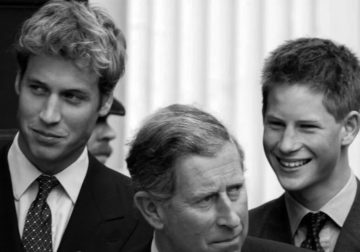Patti Davis in The New York Times:
 During the early stages of my father’s Alzheimer’s, when he still had lucid moments, I apologized to him for writing an autobiography many years earlier in which I flung open the gates of our troubled family life. He was already talking less at that point, but his eyes told me he understood. I thought of that moment when I read that Prince Harry, in his new memoir, wrote about his father, King Charles, getting between his battling sons and saying, “Please, boys, don’t make my final years a misery.” Time is an unpredictable thing. What will someone’s last memory be? I had the gift of time with my father, which allowed me to apologize, even though a disease hovered between us and clouded our communication. King Charles’s words reveal a man who is aware of his mortality and who would like his offspring to be aware of it as well.
During the early stages of my father’s Alzheimer’s, when he still had lucid moments, I apologized to him for writing an autobiography many years earlier in which I flung open the gates of our troubled family life. He was already talking less at that point, but his eyes told me he understood. I thought of that moment when I read that Prince Harry, in his new memoir, wrote about his father, King Charles, getting between his battling sons and saying, “Please, boys, don’t make my final years a misery.” Time is an unpredictable thing. What will someone’s last memory be? I had the gift of time with my father, which allowed me to apologize, even though a disease hovered between us and clouded our communication. King Charles’s words reveal a man who is aware of his mortality and who would like his offspring to be aware of it as well.
My justification in writing a book I now wish I hadn’t written (and please, don’t go buy it; I’ve written many other books since) was very similar to what I understand to be Harry’s reasoning. I wanted to tell the truth, I wanted to set the record straight. Naïvely, I thought if I put my own feelings and my own truth out there for the world to read, my family might also come to understand me better. Of course, people generally don’t respond well to being embarrassed and exposed in public. And in the ensuing years, I’ve learned something about truth: It’s way more complicated than it seems when we’re young. There isn’t just one truth, our truth — the other people who inhabit our story have their truths as well.
Prince William has, I’m sure, his own take on the physical fight that Harry has described. To really understand the dynamic between the brothers, to broaden the story and make it more complete, William’s truth has to be considered as well. Harry has written that, after William hit him, William told Harry to hit him back, which he declined to do. But by writing about the fight, he’s done exactly that.
